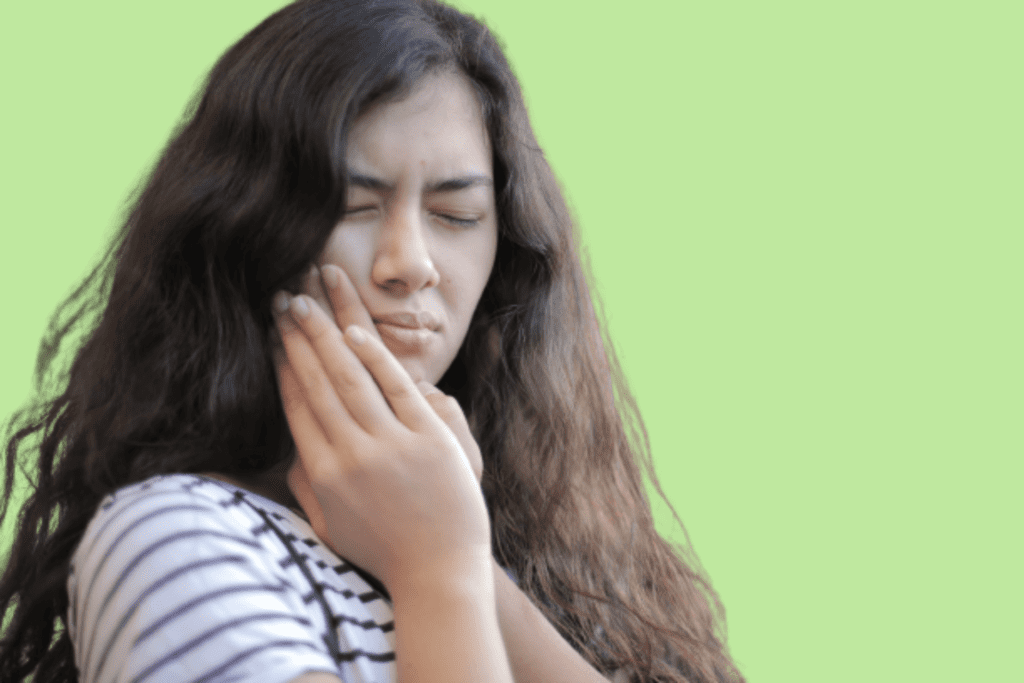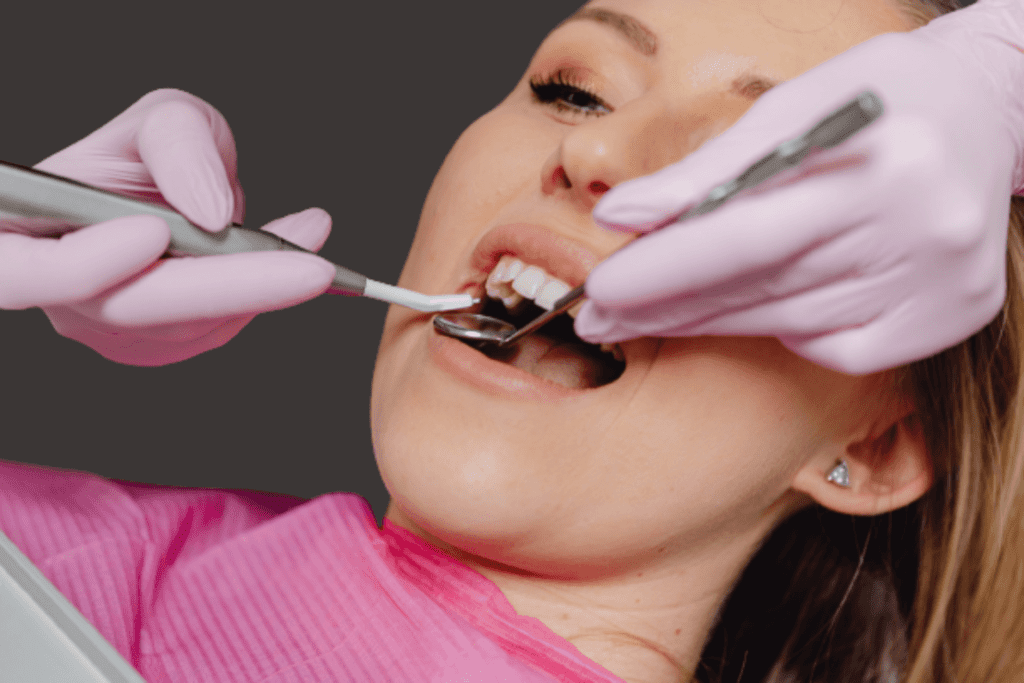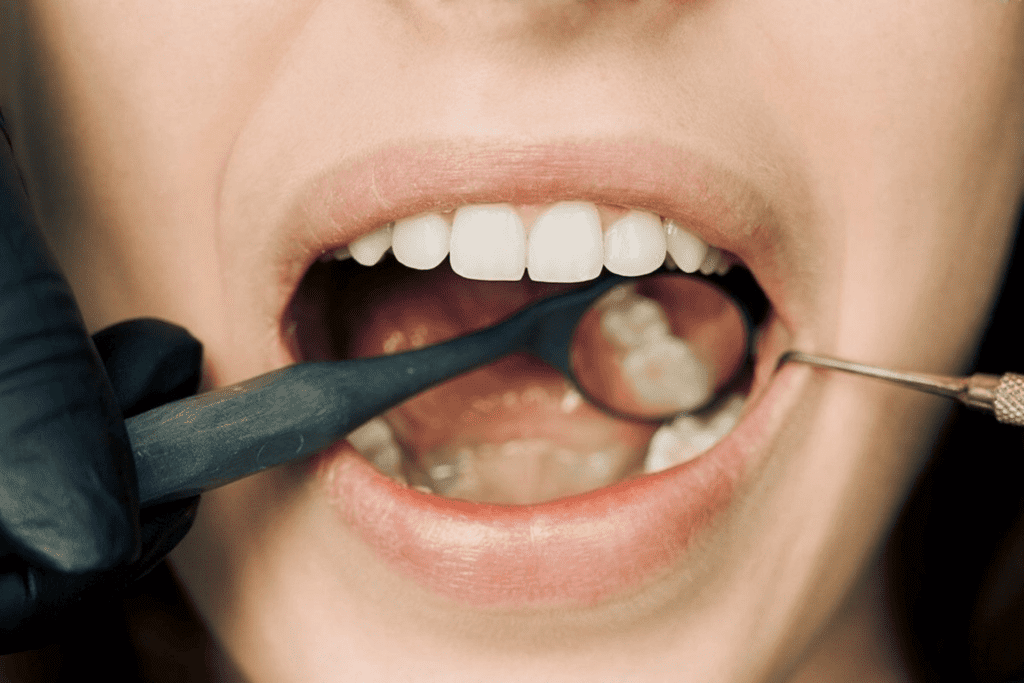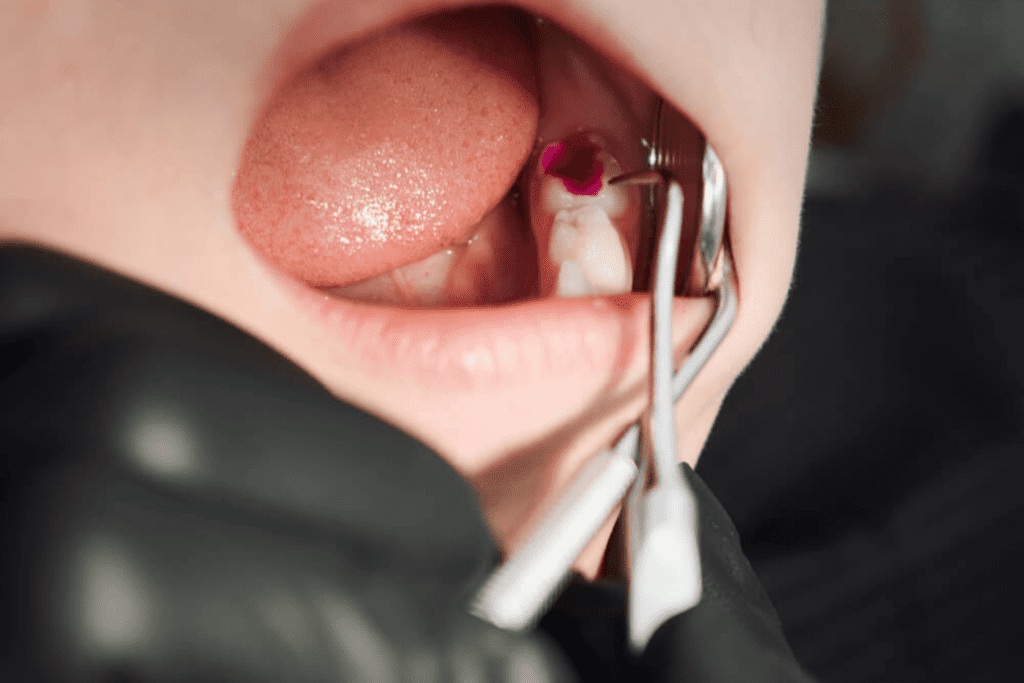Teeth grinding, also known as bruxism, is a condition characterized by the involuntary clenching, gnashing, or grinding of teeth. It usually occurs during sleep, but can also happen during waking hours. People with bruxism often do not realize they are grinding their teeth, as it often happens subconsciously.
Table of Contents
ToggleTeeth Grinding Symptoms
The symptoms of teeth grinding, or bruxism, can vary from person to person. Here are some common signs and symptoms associated with teeth grinding:
Tooth Damage
The repeated grinding motion of the teeth can wear down the protective enamel, leading to tooth damage. Over time, the teeth may become flattened, chipped, or fractured. Severe grinding can even result in tooth loss if the damage is extensive.
Jaw Pain and Facial Discomfort
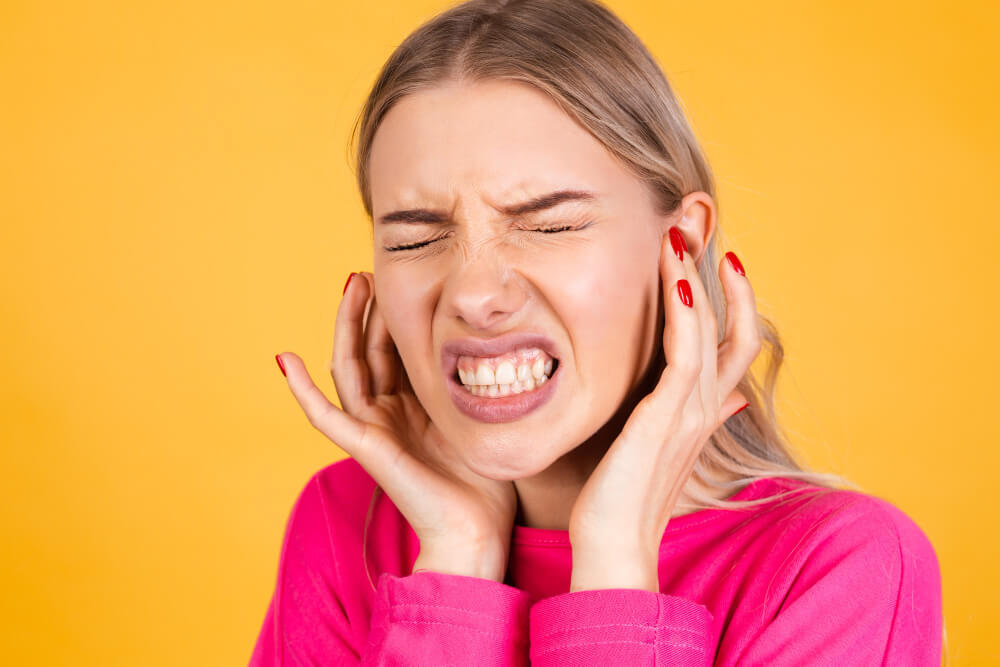
The excessive force exerted on the jaw joints during grinding can cause pain and discomfort. This pain is often felt around the temporomandibular joints (TMJs), which connect the jawbone to the skull. It can manifest as jaw soreness, stiffness, or aching sensations.
Headaches
The tension created by clenching the jaw and grinding the teeth can trigger headaches, particularly tension headaches. These headaches are often felt in the temples or the back of the head and can be particularly bothersome upon waking up.
Earaches
The jaw joints are located close to the ears, and the pressure and strain from teeth grinding can radiate pain to the ears. This can result in earaches or a feeling of fullness or discomfort in the ears.
Facial Muscle Tightness
The continuous clenching and grinding of the teeth can cause muscle tension in the face. This can lead to facial muscle pain, tightness, or aching sensations. It may be particularly noticeable around the jawline, cheeks, or temples.
Sleep Disruption
Bruxism often occurs during sleep, and the grinding sounds can even wake up the person’s bed partner. The grinding episodes can disrupt sleep patterns, leading to poor sleep quality, fatigue, and daytime sleepiness.
Teeth Sensitivity
As the tooth enamel wears down due to grinding, the underlying dentin layer, which contains sensitive nerve endings, becomes exposed. This can result in increased tooth sensitivity to hot or cold temperatures, sweet or acidic foods, and even exposure to air.
Types of Bruxism
Bruxism, or teeth grinding, can be classified into two main types based on when it occurs:
Awake Bruxism
This type of bruxism refers to grinding or clenching of the teeth during waking hours. Individuals with awake bruxism may be unaware of their habit as it often happens involuntarily or subconsciously. It can occur during periods of concentration, stress, or intense emotions. Awake bruxism is commonly associated with jaw clenching and can lead to muscle fatigue and jaw pain.
Sleep Bruxism
Sleep bruxism occurs during sleep and is characterized by rhythmic grinding or clenching of the teeth. It is considered a sleep-related movement disorder. Sleep bruxism can be further categorized based on its severity:
1. Primary Sleep Bruxism:
This refers to sleep bruxism that is not caused by any underlying medical or dental conditions. It is considered an isolated sleep-related disorder and often occurs in the absence of other sleep disturbances.
2. Secondary Sleep Bruxism:
Secondary sleep bruxism is associated with an underlying medical or dental condition. It can be a result of factors such as sleep apnea, gastroesophageal reflux disorder (GERD), medication use (e.g., antidepressants), or substance abuse.
It’s worth noting that awake and sleep bruxism can coexist in some individuals. Additionally, both types of bruxism can have overlapping causes and similar signs and symptoms, such as tooth wear, jaw pain, headaches, and disrupted sleep patterns.
What are Common Causes of Teeth Grinding?
The exact causes of teeth grinding, or bruxism, are not fully understood. However, several factors have been identified as potential contributors to this condition. Here are several frequent factors that contribute to teeth grinding:
Stress and Anxiety
Emotional stress and anxiety can trigger teeth grinding as a subconscious response to tension. The exact mechanisms linking stress to bruxism are not fully understood, but it is believed that the body’s natural response to stress can manifest as clenching and grinding of the teeth, particularly during sleep.
Sleep Disorders
Teeth grinding can be influenced by sleep disorders, including sleep apnea. Sleep apnea is characterized by interrupted breathing during sleep, leading to brief awakenings to restore normal breathing. These awakenings can result in teeth grinding as the body tries to readjust the jaw position to open the airway.
Malocclusion (Misaligned Teeth)
Malocclusion refers to the misalignment of the upper and lower teeth, leading to an improper bite. When the teeth do not fit together correctly, it can create tension in the jaw muscles, prompting grinding in an attempt to find a more comfortable position for the jaw.
Medications and Substances
Certain medications, such as selective serotonin reuptake inhibitors (SSRIs) used to treat depression, have been linked to bruxism as a side effect. These medications can affect the central nervous system and alter muscle activity, potentially leading to teeth grinding. Additionally, substances like caffeine, alcohol, and recreational drugs can stimulate the nervous system and contribute to bruxism.
Lifestyle Factors
Certain habits and behaviors can increase the risk of teeth grinding. Chewing on pens, pencils, or other objects, biting nails, or clenching the jaw due to stress or concentration can put a strain on the jaw muscles, leading to bruxism.
Age and Genetics
Bruxism can affect individuals of all ages, but it is more common in children. As children’s teeth and jaws develop, they may temporarily grind their teeth. However, bruxism tends to decrease with age. There may also be a genetic predisposition to teeth grinding, as it can run in families.
Any Deficiency Causes Teeth Grinding?
There is no specific nutrient deficiency that has been directly linked to causing teeth grinding, or bruxism. However, it is worth noting that certain nutritional imbalances or deficiencies may contribute to increased stress, anxiety, or muscle tension, which can indirectly affect the likelihood of teeth grinding. Here are a few examples:
Magnesium Deficiency
Magnesium is an essential mineral that plays a role in muscle function and relaxation. Inadequate magnesium levels in the body may contribute to muscle tension and increased susceptibility to stress and anxiety, which could potentially exacerbate bruxism.
Vitamin B5 (Pantothenic Acid) Deficiency
Vitamin B5 is involved in the production of stress-related hormones, such as cortisol. Inadequate levels of vitamin B5 may impact the body’s stress response, potentially leading to increased stress and anxiety levels, which can indirectly contribute to teeth grinding.
Vitamin B6 (Pyridoxine) Deficiency
Vitamin B6 is essential for the synthesis of neurotransmitters, including serotonin and gamma-aminobutyric acid (GABA), which play a role in mood regulation. Insufficient levels of vitamin B6 could impact the balance of these neurotransmitters, potentially affecting stress levels and indirectly influencing bruxism.
It’s important to note that these deficiencies are just potential factors that could contribute to the overall picture of stress and anxiety, which may influence teeth grinding. However, it is always recommended to maintain a balanced and varied diet to ensure adequate intake of all essential nutrients.
How to Stop Teeth Grinding in Sleep?
If you’re looking for ways to stop teeth grinding during sleep, here are some strategies that may help:
Use a Mouthguard or Splint
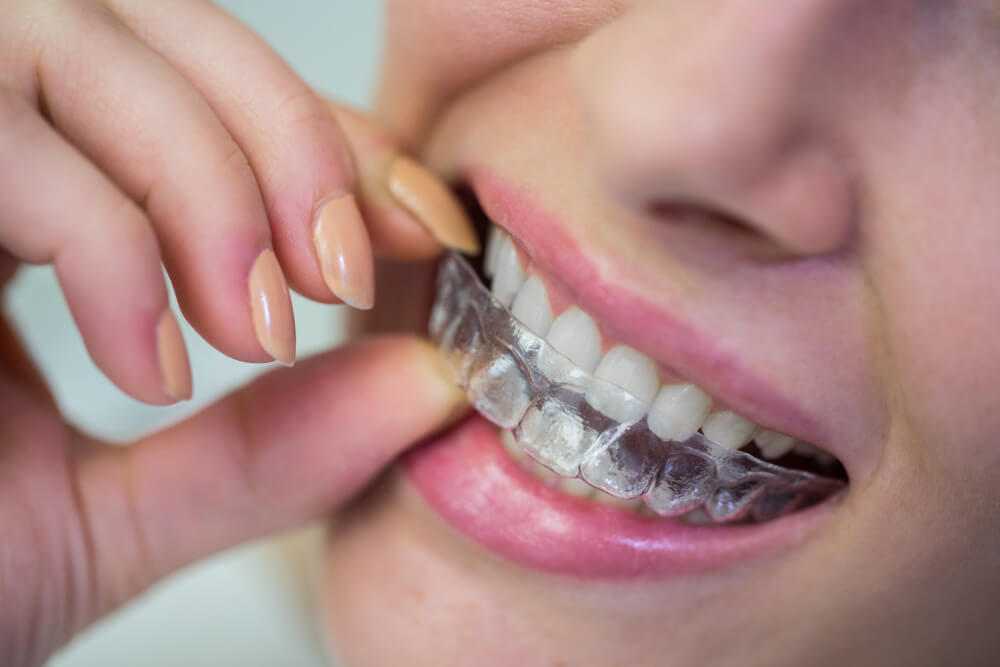
A mouthguard or splint is a custom-made dental appliance to fit your teeth. It creates a physical barrier between the upper and lower teeth, cushioning them and reducing the impact of grinding. The appliance also helps relax the jaw muscles and can protect the teeth from further damage.
Manage Stress
Since stress and anxiety can contribute to teeth grinding, finding effective stress management techniques can be helpful. Deep breathing exercises, meditation, and yoga can promote relaxation and reduce overall stress levels. Engaging in hobbies, spending time with loved ones, or seeking counseling or therapy can also assist in managing stress.
Establish a Bedtime Routine
A consistent bedtime routine can signal to your body that it’s time to wind down and prepare for sleep. Engage in calming activities before bed, such as reading a book, taking a warm bath, or listening to soothing music. Avoid stimulating activities and electronic devices, as the blue light emitted by screens can interfere with sleep.
Avoid Stimulating Substances
Stimulants like caffeine and alcohol can worsen teeth grinding. Caffeine, found in coffee, tea, and some soft drinks, can increase arousal and muscle tension. Similarly, alcohol can disrupt sleep patterns and contribute to bruxism. It is advisable to restrict or refrain from consuming these substances, particularly near bedtime.
Practice Good Sleep Hygiene
To improve your sleep quality, follow a consistent sleep schedule, ensuring you go to bed and wake up at the same times each day. Strive for 7-9 hours of restful sleep every night. Craft a sleep-friendly environment that is cool, quiet, and dark, and consider investing in a comfortable mattress and pillows. By establishing a routine and optimizing your sleep environment, you can enhance your overall sleep quality.
Relax the Jaw Muscles
Applying a warm washcloth or using a heating pad on the jaw muscles before bed can help relax them. The warmth can relieve muscle tension and promote relaxation. Gentle jaw exercises or massages can also help alleviate tension in the jaw area.
Create a Sleep-Friendly Environment
Make sure your sleep environment promotes high-quality rest. Keep your bedroom cool, quiet, and dark. Invest in a comfortable mattress and pillows that support the proper alignment of the head and neck.
Avoid Chewing on Non-Food Items
Avoid habits like chewing on pens, pencils, or other non-food objects, as this can encourage jaw clenching and teeth grinding.
Seek Professional Help
If self-help strategies don’t effectively manage teeth grinding, it’s advisable to consult a dentist or healthcare professional. They can evaluate the severity of your condition and identify any underlying causes. Depending on the evaluation, they may recommend treatments such as muscle relaxants, stress management therapy, behavioral interventions, or dental procedures to correct misalignment or adjust the bite.
Bruxism Clinical Treatment
When it comes to clinical treatment for bruxism, several options are available depending on the severity and underlying causes of the condition. Here are some common approaches:
Medications
Occasionally, medications might be prescribed to assist in managing bruxism. Muscle relaxants can be used to relax the jaw muscles and reduce grinding. Additionally, medications used to treat anxiety or stress-related disorders, such as benzodiazepines or antidepressants, may be considered if stress or anxiety is a contributing factor.
Botox Injections
Botulinum toxin (Botox) injections can be used to temporarily paralyze the muscles involved in teeth grinding. By weakening these muscles, the intensity of grinding can be reduced. Botox injections typically need to be repeated every few months to maintain the effect.
Dental Procedures
In cases where malocclusion or dental misalignment contributes to bruxism, dental treatments may be recommended. This can involve orthodontic procedures to correct the bite, dental crowns or bridges to restore damaged teeth, or reshaping the surfaces of the teeth to improve alignment.
Behavioral Therapy
Cognitive-behavioral therapy (CBT) or biofeedback techniques may be utilized to address the psychological factors associated with bruxism. These therapies help individuals identify and modify behaviors, thoughts, and emotions related to teeth grinding, as well as teach relaxation techniques to manage stress and reduce grinding episodes.
Stress Management Techniques
Since stress and anxiety can exacerbate bruxism, stress management strategies can be an essential component of treatment. Techniques such as relaxation exercises, mindfulness meditation, counseling, or stress-reducing activities can help individuals better cope with stress and reduce teeth grinding.
Splints and Mouthguards
In addition to the self-help approach mentioned earlier, dental splints or mouthguards can be provided by dentists. These oral appliances are designed to provide a barrier between the upper and lower teeth, cushion the impact of grinding, and help relax the jaw muscles.
It’s important to consult with a healthcare professional or dentist who specializes in sleep medicine or temporomandibular disorders to determine the most appropriate treatment for your specific case. They can assess the severity of your bruxism, identify any underlying causes, and develop a tailored treatment plan to address your needs effectively.
Bruxism: Common Asked Question
Here are some common questions about bruxism, along with their corresponding answers:
Q: What is Bruxism?
A: Bruxism refers to the involuntary grinding, clenching, or gnashing of teeth. It can occur during waking hours (awake bruxism) or sleep (sleep bruxism).
Q: What are the Symptoms of Bruxism?
A: Common symptoms of bruxism include teeth-grinding sounds during sleep, jaw pain or stiffness, headaches, tooth sensitivity, worn-down tooth surfaces, and disrupted sleep patterns.
Q: What Causes Bruxism?
A: The exact causes of bruxism are not fully understood, but it is believed to be multifactorial. Potential causes include stress, anxiety, malocclusion (misalignment of teeth), sleep disorders (such as sleep apnea), medications, and lifestyle factors.
Q: Is Bruxism Harmful to Teeth?
A: Bruxism can lead to dental problems over time. It can cause tooth wear, fractures, and chipping, as well as damage to dental restorations like fillings or crowns. It may also result in jaw muscle pain and temporomandibular joint (TMJ) disorders.
Q: Can Bruxism be Hereditary?
A: There is evidence to suggest that bruxism can have a genetic component. Individuals with a family history of bruxism may be at a higher risk of developing the condition.
Q: How is Bruxism Diagnosed?
A: A dentist or healthcare professional can diagnose bruxism through a comprehensive evaluation that includes a review of symptoms, a dental examination, and taking a detailed medical history. They may also recommend further assessments such as sleep studies or imaging if necessary.
Q: Can Stress and Anxiety Cause Bruxism?
A: Stress and anxiety are considered significant contributing factors to bruxism. Increased stress levels can lead to heightened muscle tension, including the jaw muscles, which can trigger teeth grinding.
Q: Can Children Have Bruxism?
A: Yes, bruxism can occur in children. It is estimated that around 15% to 40% of children may experience bruxism, which often resolves on its own as they grow older.
Q: Can Bruxism be Cured?
A: While there is no definitive cure for bruxism, its symptoms can be managed effectively through a combination of self-help strategies, lifestyle modifications, dental interventions (such as mouthguards), stress management techniques, and, in some cases, medical treatments.
Q: Should I See a Healthcare Professional for Bruxism?
A: If you suspect you have bruxism or are experiencing symptoms, it is advisable to consult with a dentist or healthcare professional. They can evaluate your specific situation, provide a proper diagnosis, and recommend appropriate treatment options based on your needs.
Conclusion
In conclusion, bruxism, or teeth grinding, is a common condition characterized by the involuntary grinding or clenching of teeth. It can occur during waking hours (awake bruxism) or sleep (sleep bruxism), and it can have various causes including stress, anxiety, malocclusion, and underlying medical conditions.
Symptoms of bruxism include tooth wear, jaw pain, headaches, and disrupted sleep patterns. While there is no definitive cure for bruxism, there are several strategies that can help manage and alleviate its symptoms. These include stress management techniques, avoiding stimulating substances, practicing relaxation exercises, creating a sleep-friendly environment, and wearing a mouthguard or splint.
Clinical treatments for bruxism may involve medications, dental procedures, behavioral therapy, and the use of Botox injections. It is important to consult with a dentist or healthcare professional for a proper diagnosis and personalized treatment plan.
While there is ongoing research into the causes and treatment of bruxism, a comprehensive approach that addresses both the physical and psychological aspects is recommended. By combining self-help strategies, lifestyle modifications, dental interventions, stress management techniques, and, if necessary, medical treatments, individuals can effectively manage their bruxism and minimize its impact on their oral health and overall well-being.
Read Next: How to Choose The Right Bruxism Mouth Guard
Resources
Image Designed by Freepik
Reference
https://www.nidcr.nih.gov/health-info/bruxism#:~:text=Bruxism%20is%20a%20condition%20where,adults%20can%20have%20this%20condition.
https://www.nhs.uk/conditions/teeth-grinding/#:~:text=It’s%20often%20linked%20to%3A,selective%20serotonin%20reuptake%20inhibitors%20(SSRIs)
https://www.ncbi.nlm.nih.gov/books/NBK482466
https://pubmed.ncbi.nlm.nih.gov/23115152/
https://www.wikihow.com/Cure-Bruxism
https://www.ncbi.nlm.nih.gov/pmc/articles/PMC4761372/

